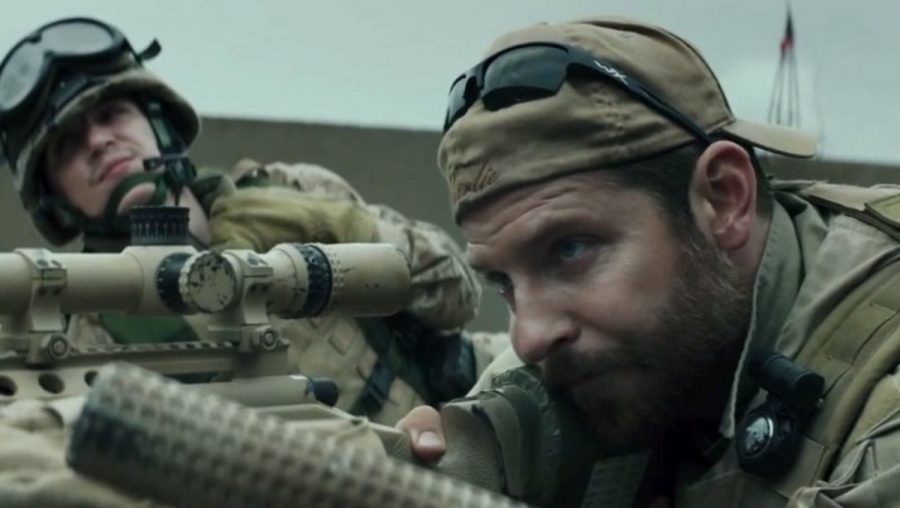By Taylor Boggs ’16, Sports Editor
Christopher “Chris” Kyle, a U.S. Navy SEAL, was the most lethal sniper, in United States history with a record of one-hundred and sixty confirmed kills. After serving four tours during the Iraq War, he was awarded several decorations for acts of heroism and commendable service in combat. Some of his achievements include two Silver Star Medals, five Bronze Star Medals, one Navy and Marine Corps Commendation Medal and two Navy and Marine Corps Achievement Medals. In 2009, after ten years of service, Kyle was honorably discharged from the US. Navy and proceeded to write and sell an autobiography entitled American Sniper in January of 2012. A year later, on February 2, 2013, Kyle was shot and killed by a veteran he was trying to help at a shooting range in Texas.
In December 2014, the film adaptation of Kyle’s autobiography was released. Directed by Clint Eastwood and written by Jason Hall, it tells the story of the deadliest marksman in U.S. history. The film stars Bradley Cooper as Kyle and Sienna Miller as his wife, Taya Kyle. So far, the film is a huge financial success. Setting numerous box office records, it is the third highest-grossing film of 2014 and the highest-grossing war film in North America. However despite the movie’s success, there have been numerous controversies during its reception.
Firstly, Chris had been working with Jason Hall and Bradley Cooper to bring his story to life when he died. After his untimely and heartbreaking death, his wife Taya worked tirelessly with the crew to carry on Chris’s dream. Taya said about Cooper and the other contributors that she feels “like they all have this huge heart for Chris” and she really feels “like they truly loved him and understood him.” In order to accurately create the movie, Taya opened her home and her memories to the filmmakers. She told of the man that Iraqi insurgents nicknamed “the Devil of Ramadi” but also told of the giving and loving man that gave her two children and whom she loved: “He was a man with a huge heart and charisma and kindness. I think the blessing is that Chris really lived.” Cooper and Hall were incredulous when they learned of the SEAL’s death, but Taya embraced them and declared that the film had to be finished and finished correctly. For Taya, she “can’t ask for better than” the story having someone’s heart “because that is what it is all about. It’s about the heart of the men and women who serve and have served—and their families.”
For reviewer Jon Davis, Sergeant of Marines, the movie was the first that accurately represented his experiences, as he was on tour in Iraq during the same time that Kyle was. The Sergeant stated simply that he didn’t usually like war movies because “they are critically acclaimed by millions who never took part in the wars, but create ridiculously stereotypical caricatures of real people who deserve more respect.” And many others agreed with him. For a lot of veterans, the film shined in its accuracies of a life filled with war. Eastwood showed the transition between multiple tours—buying a home, killing insurgents, having children, seeing your friend die, playing with the dog, having a birthday, seeing a kid die—as an accurate and realistic sequence for those deployed and their families. In the words of Jon Davis, “Living in that perpetual state of transition was a mind numbing experience.”
One of the major keys to the movie’s success was leading actor Bradley Cooper. Cooper took Kyle’s character to new levels. By studying PTSD patterns and much more, the actor dove into the lives of veterans and attempted to experience what they feel in order to accurately depict Chris’s life. Throughout the movie Cooper embodied many mannerisms of veterans: politely avoiding being thanked for saving someone’s life, getting angry when his baby was crying in the hospital and the nurse was helping another child, responding to the dog barking at a child during his son’s birthday party, etc. Cooper also accurately displayed the moral and emotional conflicts that internally plagued Kyle. Despite the fact that he was the deadliest sniper in U.S. history, his humanism is shown in the fact that he did not want to kill people and he hoped that civilians were not going to attempt to harm his platoon. This is shown during Kyle’s first kill and also after a couple of tours: later in the movie a child attempts to pick a weapon and aim it at U.S. troops, but drops it at the last second—Cooper impressively reflected the internal conflicts as he felt physically ill and was affected by even coming close to having to kill the child and he was immensely relieved when the child dropped the weapon.
In contrast, some were not pleased with the film. In a couple of examples: 1) The American-Arab Anti-Discrimination Committee said, “The release of the movie coincided with increased threats against Arabs and Muslims.” 2) Matt Taibbi of Rolling Stones Magazine believed that the movie “turned the complicated moral morass and mass-bloodshed of the Iraq occupation into a black and white fairy tale, without presenting the historical context.” 3) John Wight from Russia Today decried that that “American Sniper depicted the Iraqi people as a dehumanized mass of savages, which the white man was in the process of civilizing.” In response to these sentiments Eastwood called American Sniper the “biggest anti-war statement any film can make.” Cooper responded with the following statement: “We looked at hopefully igniting attention about the lack of care that goes to vets. Discussion that has nothing to do with vets or what we did or did not do, every conversation in those terms is moving farther and farther from what our soldiers go through, and the fact that 22 veterans commit suicide each day.” The actor believes that many criticisms ignore the fact that the film is largely about the neglect of returning veterans. First Lady Michelle Obama and Sarah Palin also spoke out in support of the movie.
Despite the controversies, Chris Kyle was a U.S. Navy SEAL and was decorated with many honors for his bravery and his dedication to protecting his family, home, and country. Kyle’s memorial service was held at Cowboys Stadium and a funeral procession stretching over 200 miles followed—hundreds of local and out-of-state residents lined Interstate 35 to view the procession and pay their respects. Today, the veteran suspected of murdering Kyle, Eddie Ray Routh, who suffers post-traumatic stress disorder, will be undergoing trials regarding the death of Kyle and his friend Chad Littlefield beginning this month.
Personally, I was a huge fan of the movie and I am an admirer of Chris Kyle’s courage and devotion to his country. Bradley Cooper did an excellent job of portraying the SEAL and all of the mannerisms that encompass the lives of veterans. As I have heard many say, and as I experienced, the entire theater was silent when the movie ended. To me this was a sign of respect and admiration for the fallen U.S. sniper and an acknowledgement of not only what veterans experience but also what they sacrifice to protect Americans. Kudos to everyone in the film—it is truly excellent and I recommend it to everyone who is willing to watch.






